Search the Special Collections and Archives Portal
Search Results

Transcript of interview with Roberta Kane by Barbara Tabach, September 6, 2017 and May 22, 2018
Date
Archival Collection
Description
Roberta “Bobbie” Kane (1932 - ) is the first known Jewish child born in Las Vegas. Her parents, Sallie and Mike Gordon, were liquor stores owners and among the founders of the first Jewish congregation in Las Vegas. Bobbie’s childhood remembrances are as a young girl who was fully aware that “Friday nights were reserved for religious services. Saturdays were always reserved for gin rummy.” In the late 1940s, as a teenager at Las Vegas High School (and 1950 graduate), Bobbie recalls Las Vegas as a small town and a joyful place to grow up. She briefly attended University of Southern California before marrying and beginning her family. In time, life brought her back to live with her parents. She pursued a career working for the Desert Inn group of hotels and helped open the Stardust in 1957. She was mentored by Mark Swain, “a six foot-four hunk of a cowboy” who worked for Moe Dalitz. This experience included driving Mark’s pink Cadillac to pick up hotel guests. This provided her with a
Text

Meeting minutes for Consolidated Student Senate University of Nevada, Las Vegas, April 28, 1988
Date
Archival Collection
Description
Text

Meeting minutes for Consolidated Student Senate University of Nevada, Las Vegas, January 21, 1988
Date
Archival Collection
Description
Text

Meeting minutes for Consolidated Student Senate University of Nevada, Las Vegas, May 1, 1986
Date
Archival Collection
Description
Text
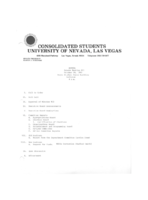
Meeting minutes for Consolidated Student Senate, University of Nevada, Las Vegas, October 28, 1980
Date
Archival Collection
Description
Text
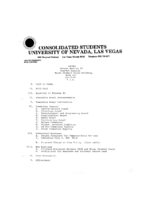
Meeting minutes for Consolidated Student Senate, University of Nevada, Las Vegas, November 17, 1981
Date
Archival Collection
Description
Text
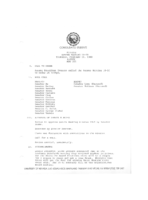
Meeting minutes for Consolidated Student Senate University of Nevada, Las Vegas, February 18, 1988
Date
Archival Collection
Description
Text

Meeting minutes for Consolidated Student Senate, University of Nevada, Las Vegas, May 04, 1982
Date
Archival Collection
Description
Text

Meeting minutes for Consolidated Student Senate, University of Nevada, Las Vegas, February 24, 1981
Date
Archival Collection
Description
Text
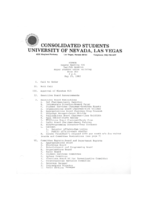
Meeting minutes for Consolidated Student Senate, University of Nevada, Las Vegas, May 25, 1982
Date
Archival Collection
Description
Text

Meeting minutes for Consolidated Student Senate, University of Nevada, Las Vegas, June 5, 1979
Date
Archival Collection
Description
Text
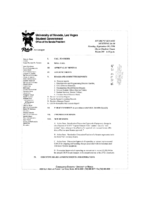
Meeting minutes for Consolidated Student Senate University of Nevada, Las Vegas, September 30, 1996
Date
Archival Collection
Description
Text
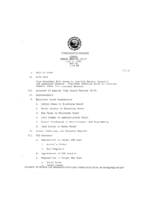
Meeting minutes for Consolidated Student Senate University of Nevada, Las Vegas, July 3, 1986
Date
Archival Collection
Description
Text
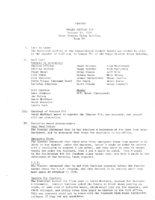
Meeting minutes for Consolidated Student Senate, University of Nevada, Las Vegas, October 17, 1978
Date
Archival Collection
Description
Text
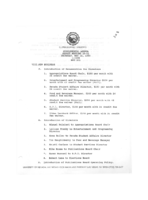
Meeting minutes for Consolidated Student Senate University of Nevada, Las Vegas, May 12, 1988
Date
Archival Collection
Description
Text

Transcript of interview with Charlotte M. Kelly by Terri Lynn Truesdell, April 4, 1976
Date
Archival Collection
Description
On April 4, 1976, Terri Lynn Truesdell interviewed real estate worker Charlotte M. Kelly (born July 18th, 1935 in Salt Lake City, Utah) in her home in Las Vegas, Nevada, about her memories of early Southern Nevada. The two discuss local history that Kelly had experienced as well as Kelly’s reasons for moving to Nevada. Kelly concludes the interview with a conversation on population growth and Nellis Air Force Base.
Text
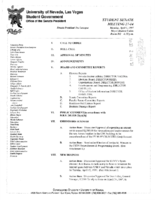
Meeting minutes for Consolidated Student Senate University of Nevada, Las Vegas, April 1, 1997
Date
Archival Collection
Description
Text
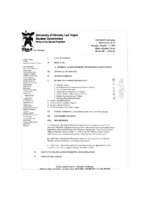
Meeting minutes for Consolidated Student Senate University of Nevada, Las Vegas, October 7, 1996
Date
Archival Collection
Description
Text

Meeting minutes for Consolidated Student Senate University of Nevada, Las Vegas, Febraury 27, 1986
Date
Archival Collection
Description
Text
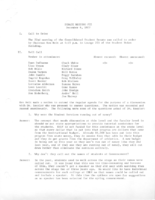
Meeting minutes for Consolidated Student Senate, University of Nevada, Las Vegas, December 6, 1977
Date
Archival Collection
Description
Text
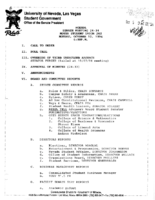
Meeting minutes for Consolidated Student Senate University of Nevada, Las Vegas, October 10, 1994
Date
Archival Collection
Description
Text

Meeting minutes for Consolidated Student Senate University of Nevada, Las Vegas, March 15, 1990
Date
Archival Collection
Description
Text

Meeting minutes for Consolidated Student Senate University of Nevada, Las Vegas, October 1, 1987
Date
Archival Collection
Description
Text
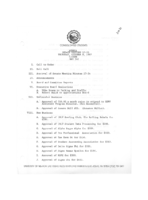
Meeting minutes for Consolidated Student Senate University of Nevada, Las Vegas, October 8, 1987
Date
Archival Collection
Description
Text
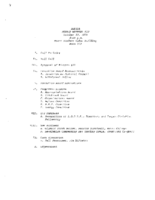
Meeting minutes for Consolidated Student Senate, University of Nevada, Las Vegas, October 23, 1979
Date
Archival Collection
Description
Text

Meeting minutes for Consolidated Student Senate University of Nevada, Las Vegas, September 21, 1989
Date
Archival Collection
Description
Text
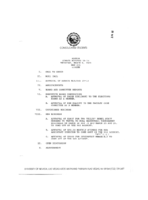
Meeting minutes for Consolidated Student Senate University of Nevada, Las Vegas, March 9, 1989
Date
Archival Collection
Description
Text

Meeting minutes for Consolidated Student Senate University of Nevada, Las Vegas, June 20, 1994
Date
Archival Collection
Description
Text
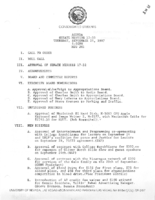
Meeting minutes for Consolidated Student Senate University of Nevada, Las Vegas, September 24, 1987
Date
Archival Collection
Description
Text
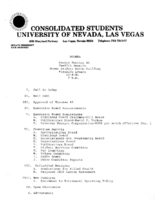
Meeting minutes for Consolidated Student Senate, University of Nevada, Las Vegas, December 08, 1981
Date
Archival Collection
Description
Text
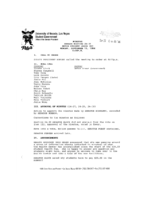
Meeting minutes for Consolidated Student Senate University of Nevada, Las Vegas, September 19, 1994
Date
Archival Collection
Description
Text

Meeting minutes for Consolidated Student Senate University of Nevada, Las Vegas, February 8, 1990
Date
Archival Collection
Description
Text

Dorothy Eisenberg interview, March 8, 2017: transcript
Date
Archival Collection
Description
Multicultural advancements in Las Vegas cannot be mentioned without speaking on the monumental contributions of Dorothy Eisenberg. From 1971 to 1998, she was involved with over 25 local organizations and committees and had the honor of having an elementary school named after her. Eisenberg’s beginnings start in the midst of the all American melting pot experience though immigration. Her mother came to the United States from Russia at age twelve and her father from Austria at age sixteen to go upholstery school. Upon marriage, they settled down in Philadelphia after the World War II. They raised Dorothy and her siblings to contribute to the community despite the anti-Semitism that was displayed there on a regular basis. Signs that said, “No dogs and Jews allowed” were common place. After her first husband died, leaving her as a single mother of four little girls, she didn’t allow herself to be trampled by her circumstances by enrolling in Temple University to be a teacher at a time when the university had stigma towards older students. Upon her marriage to her second husband, the family moved to Las Vegas where she found a spiritual home for her family at Temple Beth Sholom, where her children went learned to deeply appreciate their Jewish heritage and attended Hebrew school. Having always been involved with politics in Philadelphia, she faced personal discrimination due to her religion when she was searching for organizations to involve her time. She eventually found a home with the League of Women Voters in 1965 and became involved with the Observers Corp and became aware of what was going on with the African American community from community based research and dialogue. She played a key role as president of the organization and faced heat for her involvement in the desegregation of sixth grade centers with the Kelly vs. Guinn decision in 1972 and was involved with the Welfare Rights Movement. She met Ruby Duncan and Jane Fonda, and she even showed up to the march with her daughters. Eisenberg was heavily involved with her namesake school through meetings with principals at least once a year, reading to students in the classroom, and bringing latkes to the school on Hanukkah. She continues the intergenerational legacy of educational involvement set forth by her parents with supporting her children, grandchildren and great grandchildren in the school as well. Dorothy Eisenberg is a true role model for Nevada and a pioneer for equal education in Las Vegas.
Text

Transcript of interview with Tony Scodwell by Lisa Gioia-Acres, September 29, 2008
Date
Archival Collection
Description
Tony was born the only son of the only son in Beloit, Wisconsin. Following his parents divorce when he was 12, he and his father went to live with his grandparents who, he admits, spoiled him. While neither of his parents played a musical instrument, Tony’s grandmother was a professional organist. In addition, Tony had an uncle who was a professional saxophone player and who was an inspiration to him. Tony’s dad was very supportive of his decision to learn trumpet and rented Tony an instrument, took him to his lessens, and sat with him while he practiced. Tony was firm in his convictions by the 9th grade that he was going to be a musician. Following high school, Tony was awarded a full scholarship to the Berklee School of Music in Boston which was a very prestigious music school. Tony repeatedly left school to go on the road which the school fully expected of their students. The last time he left the school he never went back. Tony states he got his degree on the road with experience from playing in bands like Stan Kenton, Tommy Dorsey, and with his idol Harry James. Tony took his career abroad when he took up residence in Cologne, Germany to play with a band there. Tony came to Las Vegas to play in a band with Buddy Rich which turned out to be of a shorter duration than he expected. Tony then played in Las Vegas and Reno for a time before going back on the road after realizing he preferred playing jazz on the road as opposed to playing in show bands. After eight years on the road, Tony returned to Las Vegas, got married, and settled down. Aptitude tests proved accurate when they showed Tony had a talent for things mechanical and metal as Tony went on to manufacture trumpets in addition to playing them. One can feel the love Tony has for his trumpets as he describes the process of creating them. After playing trumpet for almost 30 years, Tony decided it was time to concentrate on his photography for a while. Tony does not consider himself retired, but rather he likes to play, take pictures, and, of course, he practices the trumpet every day.
Text
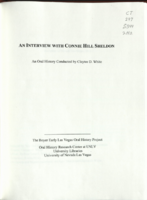
Transcript of interview with Connie Hill Sheldon by Claytee White, February 11, 2013
Date
Archival Collection
Description
Connie Hill Sheldon and her identical twin, Billie, also were members of Rancho High School 's first graduating class of 1962. Connie and Billie were born in 1944 in Oklahoma and spent their early years in southern California before moving to Las Vegas in 1956 with their mother, brother, and stepfather, Gerald Elmore. In Las Vegas Connie and her siblings attended Sunrise Acres Elementary School before going to Rancho, and the family was active with Homesite Baptist Church. While she was at Rancho Connie worked at the Huntridge Theater, and she continued working there after she graduated. In 1968 Connie married fellow Rancho '62 classmate Clyde Sheldon in Goldfield, Nevada. At the time of their marriage Clyde was an active-duty Marine. Over the course of his twenty-year USMC career the Sheldons lived in several places, but following his 1983 retirement they returned to Las Vegas and then moved to Pahrump. In this interview Connie particularly focuses on military life in New Yo
Text

Interview with Linda (Mack) Smith, June 30, 2004
Date
Archival Collection
Description
Text
International Food Service Executives Association Photograph Collection
Identifier
Abstract
The International Food Service Executives Association (IFSEA) Photograph Collection is comprised of panoramas, stills, and posed photographs of IFSEA members from 1914 to 1965.
Archival Collection

Meeting minutes for Consolidated Student Senate University of Nevada, Las Vegas, February 9, 1989
Date
Archival Collection
Description
Text
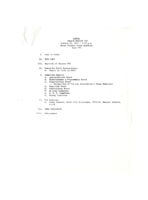
Meeting minutes for Consolidated Student Senate, University of Nevada, Las Vegas, October 16, 1979
Date
Archival Collection
Description
Text
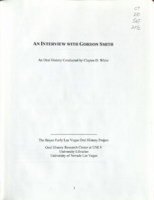
Transcript of interview with Gordon Smith by Claytee White, January 29, 2013
Date
Archival Collection
Description
Gordon Smith was born in Utah, but moved with his family to Babbitt, Nevada in 1947. His father, a barber, moved the family to Las Vegas in 1955. In this interview, Gordon recalls school and after-school pursuits; changes in the town; summer jobs; and college. He also talks about his military service and returning to Las Vegas to take up the razor himself - starting a successful barbering business of over 30 years.
Text
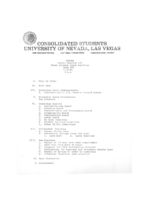
Meeting minutes for Consolidated Student Senate, University of Nevada, Las Vegas, May 26, 1981
Date
Archival Collection
Description
Text
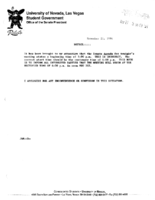
Meeting minutes for Consolidated Student Senate University of Nevada, Las Vegas, November 21, 1994
Date
Archival Collection
Description
Text
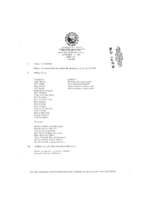
Meeting minutes for Consolidated Student Senate University of Nevada, Las Vegas, October 17, 1989
Date
Archival Collection
Description
Text
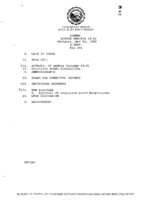
Meeting minutes for Consolidated Student Senate University of Nevada, Las Vegas, May 11, 1989
Date
Archival Collection
Description
Text

Meeting minutes for Consolidated Student Senate University of Nevada, Las Vegas, October 17, 1985
Date
Archival Collection
Description
Text
International Food Service Executives Association Records
Identifier
Abstract
The International Food Service Executive Association (IFSEA) Records contain the organizational records from the IFSEA dating from 1916 to 2010. Included are meeting programs and minutes, menus, conference reports and proceedings, financial reports, newsletters, award certificates, scrapbooks, and stewards and caterers records focusing on the hospitality and food service industry. Materials are from both national and regional branches of the organization and include records from the United States military, with whom IFSEA has partnered with since the 1960s. Club artifacts and trophies are also contained in the collection.
Archival Collection
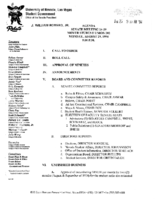
Meeting minutes for Consolidated Student Senate University of Nevada, Las Vegas, August 29, 1994
Date
Archival Collection
Description
Text
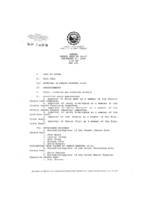
Meeting minutes for Consolidated Student Senate University of Nevada, Las Vegas, September 27, 1990
Date
Archival Collection
Description
Text

Junior Fonotisatele oral history interview: transcript
Date
Archival Collection
Description
Oral history interview with Junior Fonotisatele conducted by Cecilia Winchell and Stefani Evans on November 10, 2021 for Reflections: The Las Vegas Asian American and Pacific Islander Oral History Project. Junior discusses his Samoan background and the importance of strong family values. He talks about his early years in Utah and California before moving to Las Vegas where he attended and graduated from the University of Nevada, Las Vegas. Junior shares his employment history as a bodyguard for Floyd Mayweather, an entrepreneur of a clothing brand, and an investor into a range of ventures including security, solar energy, and mental health. He concludes with a discussion of Samoan cultural celebrations, his religion, and the significance of his tattoos.
Text
